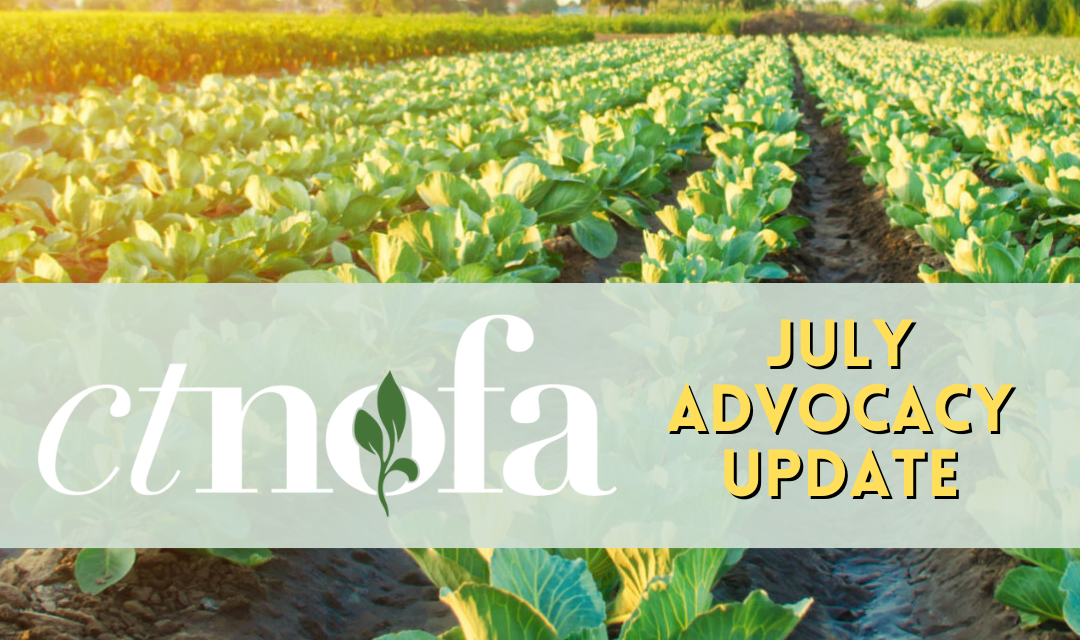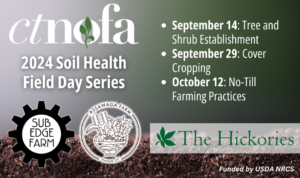July Advocacy Update

The 2023 Farm Bill
Eating is an agricultural act ⏤ Wendell Berry
We are all eaters ⏤ Bill Duesing
Whether you are a farmer, a farmworker, involved in the preparation or distribution of food, or just, like all humans, an eater, the Farm Bill touches your life. Beyond our professional roles and our roles as eaters, the Farm Bill addresses broad issues that affect the health of our communities and our environment: equitable access to food, justice for Black farmers and others historically harmed by the agricultural system, access to land and capital for new farmers, and the role of agriculture in both emitting greenhouse gases and adapting to climate change.
The Farm Bill comes up for renewal every five years and 2023 is the year that a new Farm Bill must be passed. This is our opportunity to create a more sustainable and just agricultural system.
Because the Farm Bill can be overwhelming in its complexity — the final bill will likely be over a thousand pages long — the seven NOFA chapters and MOFGA have banded together to create a unified message with just a few key priorities to focus the people of our states on action. We have identified “marker bills” — the bills legislators put forward to get their ideas for the big Farm Bill on record in order to gather support to be included in the big Farm Bill.
You can take action on the priorities identified across all eight states by going to this Action Alert page where you can send a message to both CT Senators and to your own Congressional Representative.
Here are brief descriptions of the priority bills:
Expand Opportunities in Organic
The forthcoming Opportunities in Organic Act, offers a suite of flexible, easy-to-access tools to reduce barriers to organic agriculture, including for Black farmers, Indigenous farmers, farmers of color and producers historically excluded from organic certification. It will modernize reimbursements for organic certification, increase technical expertise and support within public institutions and NGOs and expand support for producers transitioning to organic.
Demand Climate Action
The Agriculture Resilience Act will harness the power of agriculture to confront our climate and biological crises. With urgent action now, including the investments and policy reforms in the ARA, we can meet our climate goals and dramatically improve our food system while engaging farmers in making the critical changes necessary for our future.
Support Organic Dairy
Immediate support to address dramatically increased organic input costs for organic dairy farms is urgently needed to reverse the alarming decline in family organic dairy farms in the northeast. Organic Farmers Association’s priorities for organic dairy will increase organic milk market transparency by requiring AMS to publish organic-specific data, invest in local infrastructure and ensure that disaster relief efforts support the specific needs of organic dairy farms. Systemic reforms such as those detailed in the Milk from Family Dairies Act are also needed to ensure farm viability and market opportunities for all family dairies.
Secure Equitable Access to Land and Credit
USDA has a demonstrated history of discriminating against Black, Indigenous and farmers of color in lending and credit practices and program implementation. Our nation must take action now to facilitate secure, affordable access to land and access to credit for young farmers and farmers of color—there is no time to wait. The reforms in the Justice for Black Farmers Act and the Fair Credit for Farmers Act are a first step in addressing and correcting discrimination against Black farmers in farm assistance and lending programs and to ensure representation on county FSA committees.
Reject False Solutions
We join with our allies across the many sectors of the food system in opposing legislation that will increase consolidation and corporate power through mechanisms that prioritize short term profit over long term sustainability, such as carbon markets and biogas markets. These false solutions focus too narrowly on carbon or methane at the detriment of biodiversity, ecosystem health and function, and allow bad actors to continue to pollute while further entrenching farmers in systems of chemically-intensive agriculture. (To learn more about what we mean by “false solutions”, check out this explainer from our allies at IATP.)
Protect Farms from PFAS
Farmland that is contaminated with PFAS (aka forever chemicals) is a threat to public health and farm viability and must be addressed to ensure a safe and prosperous future. As PFAS contaminated soil, milk, and even produce and crops are detected, farm families and farmworkers are most vulnerable and need immediate support to protect themselves, their business, and their communities against continued exposure. The Relief for Farmers Hit with PFAS Act would authorize funding for states to assist affected farmers, expand monitoring and testing, and fund PFAS research.
Want to see a great basic overview of the Farm Bill in just over 4 minutes of video? Check this out from the National Sustainable Agriculture Coalition (made for 2018 Farm Bill, but still good.)
Recent Posts
CT NOFA Announces 2024 Slate of Soil Health Field Days
Beginning in late summer, CT NOFA will host three field days centered on soil health…
Read MoreCT NOFA Board Member, Freedom Gerardo, Featured on New Hampshire Public Radio
CT NOFA board member, Hector “Freedom” Gerardo, was recently featured on New Hampshire Public Radio’s…
Read More

